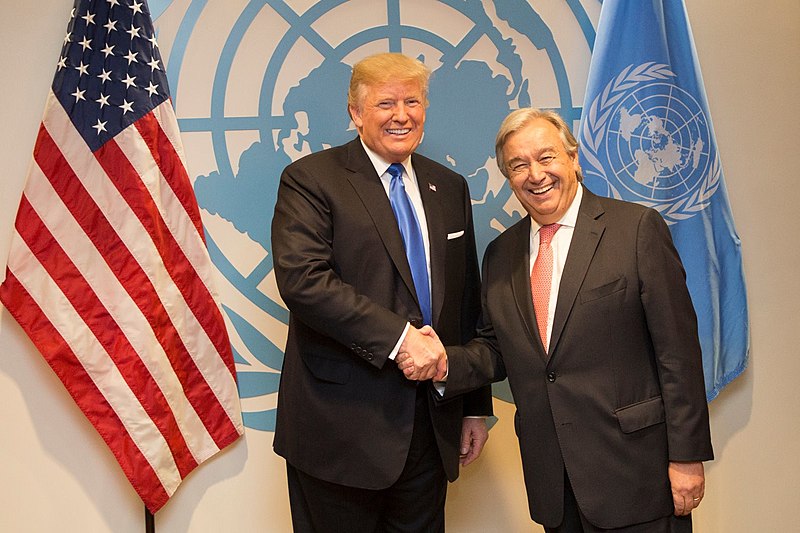Trump boasts his isolationist policies before an opposing United Nations
Trump’s isolationist policies contrast UN Secretary General Antonio Guterres’ advocacy for globalism
October 4, 2018
President Trump, is this the way America’s global dominance ends; not with a bang, not with a whimper, but in laughter?
President Donald Trump pontificated before the 73rd session of the United Nations General Assembly of having in two years, “accomplished more than almost any administration in the history of our country.” Members of COD’s Model United Nations were surprised by his boast which managed to unite an often divided chamber of feuding, self-interested leaders into a cascade of light mockery. Their laughter symbolized a united opposition against Trump’s anti-globalist policies.
A populist who campaigned on the predicate of America being the laughing-stock of the world now found himself at the butt-end of his own joke.
College of DuPage Political Science Professor Christian Goergen warned of Trump’s rejection of globalization and preference of isolationism over multilateral cooperation.
“Nationalists like Trump want bilateralism because they believe they can use their nation’s power to intimidate those they negotiate with,” he said. “However, only global solutions can solve global problems. Climate change, multi-national terrorism and nuclear de-proliferation can only be addressed through multilateralism. What happens in one part of the globe directly affects another. Before WWI, bilateral treaties between European countries resulted in a situation of insecurity that was destined to collapse into war.”
Goergen founded COD’s Model United Nations club 22 years ago to inspire students to learn about international diplomacy and see the world from a different perspective.
Current club President Anna Gorman said the U.N. provides an important forum for world leaders to engage each other.

“People criticize the U.N. for not having the authority to enforce their rules, but it provides a place to discuss global issues and propose solutions. When you’re dealing with de-stabilized regions, approaching with a united force makes a stronger resolution. Any unilateral attempt is limited in its fundamental structure.”
Gorman said the club immerses students in the global discussion. She represented Russia on nuclear proliferation when the club visited Emory University in Georgia last year.
Club member Kevin Ashley represents the Sixth Committee, which considers all legal standings in the U.N., especially humanitarian law.
“The club provides political understanding by us representing a delegation to a mock-U.N. and arguing our country’s position in front of a General Assembly,” said Ashley.
He explained the benefits of multilateral cooperation.
“With a worldwide community paying attention to events like ethnic cleansing in Myanmar, we can address issues in a more effective matter. We can hold that country’s government responsible, or involve peace-keeping units if necessary.”
Representing an existential threat to multilateralism, anti-globalist waves have led backlashes against international bodies and brought success to anti-establishment politicians. Seen in the UK’s Brexit, Trump’s victory in America, Rodrigo Duterte in the Philippines and anti-immigration advocates across Europe, populists hail the call for protectionism and global regression.
“As guardians of the common good, we also have a duty to promote and support a reformed, reinvigorated and strengthened multilateral system,” said U.N. Secretary General Antonio Guterres before the General Assembly. “Those who see their neighbors as dangerous may cause a threat where there was none. Those who close their borders to regular migration only fuel the work of traffickers. And those who ignore human rights in combating terrorism tend to breed the very extremism they are trying to end,” he said.
Goergen dismantled anti-globalists fear as a misunderstanding of the U.N.’s actual power.
“There’s no merit to fearing a big world government threatening nations’ sovereignty,” he said. “The operating annual budget of the U.N. is only $6.5 billion. That’s less than the city of Chicago.”
Goergen believes anti-globalists are opposing the wrong people because globalization is driven by multinational corporations who make greater profits by going global. He believes reversing the process would be catastrophic for global stability.
Ashley agreed, “I understand Trump’s position where America needs its sovereignty and self-dependence. However, no country has the means to be truly self-efficient in the modern global economy.”
Gorman added, “There is a danger in becoming more isolated. Historically, isolationist nations have fallen behind economically.”
Trump has implemented protectionist policies under his direction to “Make America Great Again.” Globalists see every diplomatic concession to protect domestic industry as undermining America’s global hegemony. As influence is relinquished, more willing nations are stepping into the power vacuum.
Goergen pointed to Trump’s withdrawal from the Human Rights Council, UNESCO, the UNRWA and the Paris Climate Agreement as setting a dangerous precedent.
“It encourages nationalist and populist countries to follow. It provides authoritarian leaders the excuse they are looking for,” he said. “However, it can unite other countries to come together and oppose such behavior.”
Ashley explained Trump’s predecessor, President Barrack Obama, showed a different, more successful approach in drawing up the Paris Climate Agreement and making it non-binding.
“That was the only way to get so much of the world to agree,” he said. “Trump made the point America was doing more for the agreement, but that was precedent to inspire other countries. Now you see countries like China and France taking the opportunity to increase their power and show the rest of the world they can do it better than the U.S.”
French President Emmanuel Macron used his General Assembly address to reassure the world of France’s global leadership.
“I do not accept the erosion of multilateralism and don’t accept our history unraveling,” said Macron.
In a statement directed at Trump’s isolationist policies, he urged world leaders not to sign trade agreements with those who don’t support the Paris Climate Agreement.
Similar commitment is witnessed in the persistence of supporting nations trying to save the Iran nuclear deal after Trump’s withdrawal and threat of economic sanctions for businesses that deal with Iran.
The U.N. was founded upon the ashes of WWII and manufactured to maximize the power of the war’s victors.
Goergen believes one way the U.N. can accommodate anti-globalist fears is by reforming the antiquated Security Council. He believes the permanent members’ authority to veto any decision too often leads to stagnation. The Security Council no longer reflects the reality of the world balance.
He believes they should increase the permanent members to include a developing-nation. The British and French seat would be replaced with a European Union seat. South America must get representation, and Asia and the Middle-East need a voice. Also, the possibility of including the African Union could promote unity on their continent.
“With the current permanent members’ veto powers, they will refuse to submit any of their power. This provides a moral problem for the Security Council delegitimizing their authority,” said Goergen.
The greatest problem both globalists and anti-globalists want addressed is the U.N.’s sovereignty issue.
No country wants to give authority to an international body that can persecute its citizens.
However, Goergen countered, the U.N. charter states each country should have and respect national sovereignty and the U.N. is established to protect it. The body’s laws and institutions have helped foster global stability resulting in a more peaceful world than 50 years ago.
Gorman stated, “If the U.N. mandated their rules be followed, nations would fail to cooperate. The point is to create a discussion between nations. The only way the U.N. can apply pressure is by promoting economic sanctions against un-cooperating nations like Myanmar for their human rights abuses against their Rohingya Muslim minorities.
She believes anti-globalists like Trump shouldn’t fear the jurisdiction of international bodies, but should embrace their justice as a way to provide security and global stability.
Ashley said, “The U.N. only draws the line where grave abuses hurt humanity as a whole. You cannot make yourself a nuclear power when you shouldn’t be. You can’t slaughter minorities just because they think differently than you, and you can’t sign brutal laws to increase your power while your citizens suffer in poverty. The U.N. is an observer that intervenes when necessary; it’s not an authoritarian power dictating what to do.”
Legal frameworks like nuclear disarmament in North Korea and the Iran-Nuke deal are predicated upon mutual support and trust.
“Trump pulling out of the Iran-Nuke deal was short-sighted and impulsive. With all of the nations who came together to support the deal, the U.S. cannot afford to be isolated on this issue,” said Gorman.
Goergen believes Iran has incentive to stick to the deal, and the IAEA has determined Iran has complied in the deal’s requirements.
Multilateral cooperation provides economic incentives for nations to comply. The U.N. can pressure countries to address human rights violations by making it mutually beneficial to comply.
Ashley insisted the Syrian civil war is a perfect example of how the U.N. can maintain global security and protect citizens against violence.
“The moment the U.N. takes up a deciding position on who should win, cooperation will halt. Their role should strictly be humanitarian; aiding the civilian population, setting up camps for the displaced, and helping refugees integrate into other countries.”
Globalists see accepting the responsibilities that come with power as a sign of strength. They see America turning away from its global commitments exemplifying its further digression into parochial policies.
Goergen believes only multilateral cooperation provides the antidote to global inequality.
“Nationalists like Trump believe nations should only look after their self-interests. However, does power come with responsibility to help those around the world? Morally, should the strong and powerful intimidate the weak, or should they help (nurture) their success.”


















